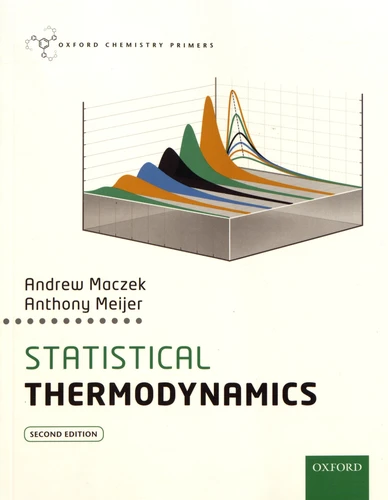Statistical Thermodynamics
2nd edition
Par : , Formats :
- Paiement en ligne :
- Livraison à domicile ou en point Mondial Relay estimée à partir du 18 décembreCet article sera commandé chez un fournisseur et vous sera envoyé 10 jours après la date de votre commande.
- Retrait Click and Collect en magasin gratuit
- Livraison à domicile ou en point Mondial Relay estimée à partir du 18 décembre
- Réservation en ligne avec paiement en magasin :
- Indisponible pour réserver et payer en magasin
- Nombre de pages120
- PrésentationBroché
- FormatGrand Format
- Poids0.243 kg
- Dimensions18,9 cm × 24,5 cm × 1,2 cm
- ISBN978-0-19-877748-9
- EAN9780198777489
- Date de parution25/05/2017
- CollectionOxford Chemistry Primers
- ÉditeurOxford University Press
Résumé
The renowned Oxford Chemistry Primers series has been refreshed and updated to suit the needs of today's students, lecturers, and postgraduate researchers. The rigorous, yet accessible, treatment of each subject area is ideal for those wanting a primer in a given topic to prepare them for more advanced study or research. Moreover, cutting-edge examples and applications throughout the texts show the relevance of the chemistry being described to current research and industry.
Statistical Thermodynamics gives a concise and accessible account of this fundamental topic by emphasizing the underlying physical chemistry of the atomic and molecular level, while introducing the mathematical concepts in an approachable way. The material is presented in short, self-contained sections, making it flexible both for learning and for teaching. The separate sections are finally brought together by a series of detailed applications to real systems.
Throughout the text, frequent diagrams and marginal notes are provided to support learning. End-of-chapter problems are included to encourage active participation and thus promote deeper understanding. New to this edition : an Online Resource Centre with interactive questions for students and downloadable figures for instructors ; new end-of-chapter summaries help you understand the key 'take home' points for each topic ; new numerical problems at the end of the book enable you to practice using the material covered in the primer to solve novel problems ; an appendix covering additional mathematics, for those who wish to extend their understanding in a more formal and detailed manner.
Statistical Thermodynamics gives a concise and accessible account of this fundamental topic by emphasizing the underlying physical chemistry of the atomic and molecular level, while introducing the mathematical concepts in an approachable way. The material is presented in short, self-contained sections, making it flexible both for learning and for teaching. The separate sections are finally brought together by a series of detailed applications to real systems.
Throughout the text, frequent diagrams and marginal notes are provided to support learning. End-of-chapter problems are included to encourage active participation and thus promote deeper understanding. New to this edition : an Online Resource Centre with interactive questions for students and downloadable figures for instructors ; new end-of-chapter summaries help you understand the key 'take home' points for each topic ; new numerical problems at the end of the book enable you to practice using the material covered in the primer to solve novel problems ; an appendix covering additional mathematics, for those who wish to extend their understanding in a more formal and detailed manner.
The renowned Oxford Chemistry Primers series has been refreshed and updated to suit the needs of today's students, lecturers, and postgraduate researchers. The rigorous, yet accessible, treatment of each subject area is ideal for those wanting a primer in a given topic to prepare them for more advanced study or research. Moreover, cutting-edge examples and applications throughout the texts show the relevance of the chemistry being described to current research and industry.
Statistical Thermodynamics gives a concise and accessible account of this fundamental topic by emphasizing the underlying physical chemistry of the atomic and molecular level, while introducing the mathematical concepts in an approachable way. The material is presented in short, self-contained sections, making it flexible both for learning and for teaching. The separate sections are finally brought together by a series of detailed applications to real systems.
Throughout the text, frequent diagrams and marginal notes are provided to support learning. End-of-chapter problems are included to encourage active participation and thus promote deeper understanding. New to this edition : an Online Resource Centre with interactive questions for students and downloadable figures for instructors ; new end-of-chapter summaries help you understand the key 'take home' points for each topic ; new numerical problems at the end of the book enable you to practice using the material covered in the primer to solve novel problems ; an appendix covering additional mathematics, for those who wish to extend their understanding in a more formal and detailed manner.
Statistical Thermodynamics gives a concise and accessible account of this fundamental topic by emphasizing the underlying physical chemistry of the atomic and molecular level, while introducing the mathematical concepts in an approachable way. The material is presented in short, self-contained sections, making it flexible both for learning and for teaching. The separate sections are finally brought together by a series of detailed applications to real systems.
Throughout the text, frequent diagrams and marginal notes are provided to support learning. End-of-chapter problems are included to encourage active participation and thus promote deeper understanding. New to this edition : an Online Resource Centre with interactive questions for students and downloadable figures for instructors ; new end-of-chapter summaries help you understand the key 'take home' points for each topic ; new numerical problems at the end of the book enable you to practice using the material covered in the primer to solve novel problems ; an appendix covering additional mathematics, for those who wish to extend their understanding in a more formal and detailed manner.


